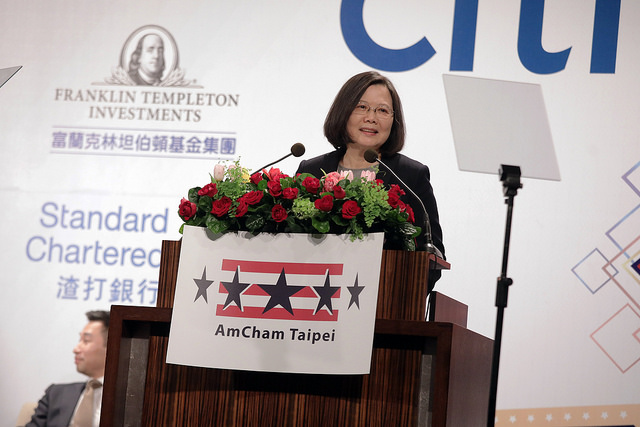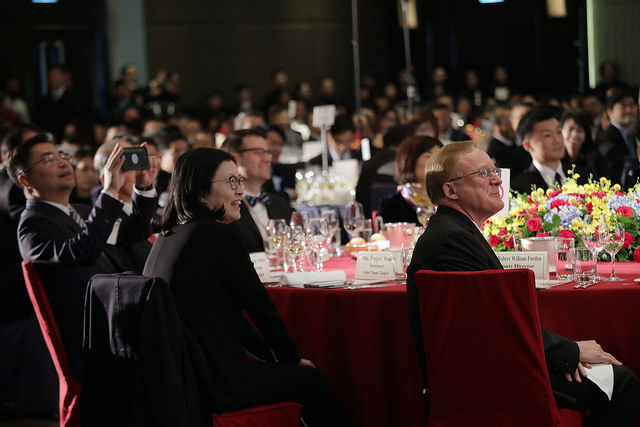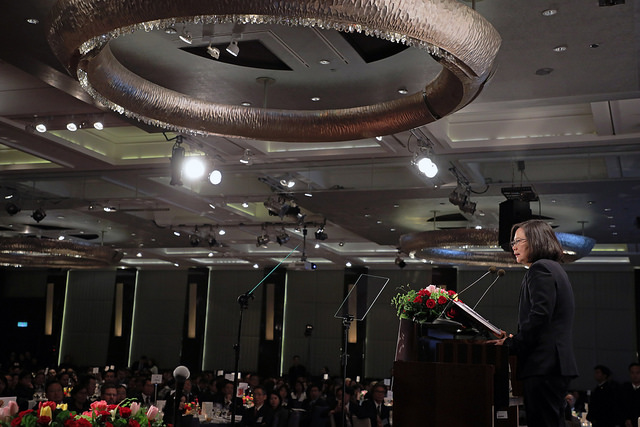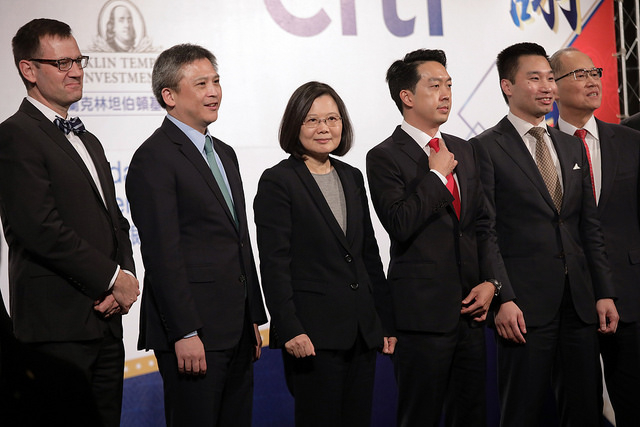News & activities
 News releases
News releases
On the evening of March 21, President Tsai Ing-wen attended the American Chamber of Commerce (AmCham) Hsieh Nien Fan (謝年飯) celebration. In her remarks, the president paid tribute to the far-reaching and increasingly close partnership between Taiwan and the United States. She also expressed hope that AmCham will continue to promote more trade exchanges and create new opportunities for cooperation while working with our government to increase the momentum driving Taiwan's economic development.
A transcript of the president's remarks follows:
Good evening everybody. It's a great pleasure to be back at the American Chamber of Commerce Hsieh Nien Fan. I want to thank you, Albert (Albert Chang, 章錦華, Chairman of the AmCham Taipei), for your warm hospitality and for hosting this event. And I also want to take this opportunity to welcome William Foreman, AmCham's new President. I hope you enjoy your new home in Taipei, and know that you will continue to build on the great job AmCham has been doing all across Taiwan.
After all, you know you're doing great work when you have the president and many members of the cabinet joining in for your Hsieh Nien Fan every year. It has become some sort of an obligation for the president to be here.
Tonight, in addition to Kin (Kin Moy, Director of Taipei Office of American Institute in Taiwan) and his team at AIT, I also want to welcome a special visitor from Washington, DC. That is Alex Wong. Alex Wong is no stranger to Taiwan. Previously, as the Foreign Policy Adviser to Senator Tom Cotton, Alex was a fierce proponent of stronger Taiwan-US relations on Capitol Hill. Now, as Deputy Assistant Secretary for East Asian and Pacific Affairs, Alex will surely play a pivotal role in ensuring a more stable security environment in the region. In addition to that, I want to make this comment. I heard that he is a graduate from Harvard Law School. You know I'm allergic to that school. It's not that I have trouble with the graduates of Harvard Law School. It's just that I was not accepted by Harvard Law School. It turns out that I have received what might be an even better legal education from the Cornell Law School.
I also want to acknowledge all of our cabinet ministers, diplomats, and business leaders with us tonight. All of us are here for the same purpose: we want to see Taiwan's economy further grow and prosper. All of us have a vested interest in it. Over the past year, by working together, we have already made monumental progress. Tonight, I hope we can all see this event as more than a dinner, but a continuation of the working relationship we have established between business, government, and the international community.
With this in mind, let me begin tonight by expressing my appreciation for AmCham. Your long-standing business leadership and the work you do in promoting economic growth in Taiwan have been invaluable. Many of your members have been here for decades. Your contributions to our economy in terms of investment and employment are considerable. Each year, through your Doorknock trip and other initiatives, you've been a tireless advocate for stronger relations between Taiwan, the US, and the international community at large.
As a country looking to attract more foreign investment, we have long benefited from the advice – advice that is sometimes very candid – provided in your annual Taiwan White Paper. Another source of good feedback is your members' views expressed in the Business Climate Survey (BCS). This is an important mid-term report for the government. We welcome the confidence conveyed in the latest BCS for the economic outlook this year and the intention of many firms to hire more employees. This is a key sign that our economy is moving in the right direction.
Don Shapiro (Editor-in-Chief of Taiwan Business TOPICS, and Senior Director of the AmCham Taipei) and his team at Taiwan Business TOPICS have also been fantastic. His in-depth articles on a range of Taiwan economic issues – whether it's healthcare, labor, or finance – have been influential and insightful. They have been a valuable source of feedback for our policymakers.
Over the years, AmCham has also played a vital role in building the Taiwan-US economic partnership. As I mentioned, your annual Doorknock Delegation to Washington does a great deal helping Congress and the US administration understand the importance of Taiwan, as well as our trade and investment relations. Furthermore, your efforts to help rally US support for Taiwan's participation in both bilateral and regional economic initiatives are appreciated by the government and the business community here.
AmCham's work advancing Taiwan-US relations goes alongside our work – the government's work – in strengthening the bilateral partnership. In this area, I want to share with you all the incredible advancements we've seen over the past year.
Just a few days ago, we were pleased President Trump signed the Taiwan Travel Act into law. We're grateful to the Trump administration and to members of the Congress for supporting this bill and bringing it forward.
We also welcome Deputy Assistant Secretary Wong as the latest to be here following visits by senior US officials at the State Department, Department of Commerce, Small Business Administration, and more. In fact, we've seen an ever growing number of visitors from the States and visiting US officials, facilitating discussions on important issues from the digital economy to the New Southbound Policy. I believe their visits attest to the far-reaching and ever closer nature of our bilateral partnership.
Furthermore, the announcement of a major arms sale last year – within the first five months of President Trump's administration – showcased the United States' unwavering commitment to Taiwan's continued safety and security. We appreciate this support and I'm sure many members of AmCham do as well.
On a more individual level, people-to-people exchanges are flourishing. Tourism between our two countries is higher than ever before, with growth of 7% and 9% for inbound and outbound tourists. We're also seeing more flights, including an inaugural flight between Taipei and Ontario, California, by China Airlines this Sunday. These developments have been good both for our citizens and for business. Following the opening of the Global Entry and e-Gate systems last November, I fully expect we will continue to see these numbers increase in the years ahead.
All of this is leading up to a major event. As you may have heard, AIT will be opening their new office compound in Neihu in June. If you haven't heard, be sure to ask your real estate agent. I hear it has become rather fashionable to live "above" the AIT. As I have been told, at a time of austerity, this is one of the few new openings around the world, demonstrating the United States' firm commitment to Taiwan. Kin has already made sure that I have marked it down on my calendar. So I want to assure you again here that I will be there, along with perhaps half of Taipei.
The positive direction Taiwan-US relations have taken over the past few years more broadly reflects the importance of our shared strategic goals in Asia. Our deep and abiding belief in democracy, freedom, and free markets forms the foundation of this partnership. This will not change. We share a common interest in protecting these values and encouraging their development around the region. We know that wherever they flourish, peace, stability, and prosperity will follow.
Within Taiwan, a lot has also taken place over the past year. Economically, our reforms to make it easier to do business in Taiwan are bearing fruit.
Recently, the cofounder of YouTube, Mr. Steve Chen (陳士駿), became the first recipient of our new Employment Gold Card, which gives international talent much greater job flexibility. This is just one aspect of our measures for the recruitment and employment of foreign professionals, which ease rules on visas, residency, insurance, taxes, and pensions. We have also adopted an Entrepreneur Visa, for instance, making it much easier to start a business and stay in Taiwan.
We have also reformed the tax code to simplify rates for both individuals and investors. The new amendments will facilitate the government's efforts to revitalize the economy, increase take-home pay, and invest in our next generation. As one accounting firm stated, "It is a big step forward for Taiwan's tax system to become more aligned with international trends and practices."
In December, the legislature passed Patent Linkage legislation to further protect the intellectual property rights of pharmaceutical companies and bring ourselves up to international standards. But now we're working to amend other laws to allow for more flexible business arrangements and attract more foreign investment. Many of these issues are, as always, covered by AmCham's White Paper and we're encouraged by the warm reception they have received among our overseas investors.
Amid these reforms and improvements, we have shown that the government is willing to listen. If you take no other message home tonight, I hope you will remember this: the government here is ready to listen and work with all of you.
Let me remind you, Albert, last year when you were here delivering your opening remarks, you mentioned labor standards law. This year you mentioned toilet paper in addition to the labor standards law. You are kind enough to mention that we have made progress in the labor law area. I'm sure that we will do much better next year in terms of toilet paper.
Over the next year, AmCham members can be assured that this administration will continue to place the economy first. This I promise you. We will continue to work with all stakeholders to accelerate the pace of innovation and industrial reform, make more investments in our infrastructure, and promote trade and economic opportunities with major trading partners around the world.
Even in the area of defense, which is a major priority of ours, we are creating new opportunities for defense industry cooperation. Our commitments to increase investment in our defense capabilities will have a multiplying effect across the industry. This will be good for Taiwan and for business.
Furthermore, we will redouble efforts for Taiwan to participate in bilateral, multilateral, and regional economic agreements. With our economy picking up steam and reforms kicking into gear, conditions are ripe for Taiwan to strengthen its economic linkages with the international community. We will step up engagements with CPTPP (Comprehensive and Progressive Agreement for Trans-Pacific Partnership) members so that Taiwan, as a key link in the Asia-Pacific supply chain, can participate in any potential membership discussions.
On this occasion last year, I ended my remarks with the hope that our concerted efforts would give rise to stronger and more sustained economic growth.
Tonight I'm happy to say that we are succeeding. The economic growth rate last year rose to 2.86%, exceeding initial forecasts. January's unemployment rate is down to 3.63%, the lowest January rate in 17 years. Salaries have increased by over 2.4%, marking an end to over a decade of salary stagnation. At the same time, our stock market is stronger than ever, with the TAIEX now sustaining trading over 10,000 points.
All these indicators point to a solid and continuing economic recovery for Taiwan. For the first time in a long period, our economy is picking up speed and momentum. It's a great time to do business and invest in Taiwan.
This year, I hope that we will continue to come together to extend such economic growth. All the interests represented here tonight – from business, government, and the international community – have a shared role and common stake in seeing a more economically prosperous Taiwan. Already, we have made great progress and yet, I know we can do more. At a time when we have restored economic momentum, I invite all of you to think bold, dream big, and believe in Taiwan.
Thank you!












